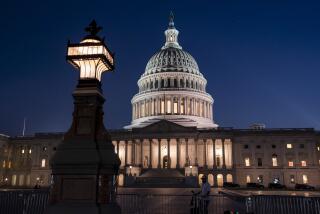After a surprise snag, Democrats agree to move ahead on COVID-19 relief bill

WASHINGTON — Senate Democrats got a reminder of the political realities of their narrow majority Friday when the COVID-19 relief bill they had unveiled a day earlier had to be scaled back and progress was temporarily halted — not because of Republican opposition, but by Democratic infighting.
The chaos reflected the challenges Senate Democrats face in shaping legislation that meets the demands of both progressives and centrists in their party, particularly in a Senate divided 50-50, where every vote is critical.
In order to appease moderate Sen. Joe Manchin III (D-W.Va.), Senate Democrats had to slash the weekly federal unemployment supplement in their bill from $400 to $300.
But in a nod to progressives, the weekly benefit will last until Sept. 6, slightly longer than under the House version, according to the deal reached Friday night.
In addition, the agreement provides tax relief to workers who have received pandemic unemployment benefits by making the first $10,200 nontaxable for households with incomes under $150,000 a year, a Democratic aide said.
The changes, and the nine-hour delay in advancing the legislation Friday, came after Manchin expressed concern that $400 payments — part of the House-passed bill and the original Senate bill — would provide some laid-off workers with more money than they earned at their jobs, thereby discouraging them from going back to work.
Democrats announced several tweaks to their bill on Friday morning, including the reduction in the unemployment supplement to $300 a week. They also said they would extend the benefits until the end of September and make up to $10,200 in unemployment compensation tax-free for everyone.
President Biden supported the changes, White House Press Secretary Jen Psaki said in a tweet Friday. During an economic briefing with Treasury Secretary Janet L. Yellen on Friday, Biden urged Congress to act quickly.
“People in the country are hurting right now, with less than two weeks from enhanced unemployment checks being cut out,” he said.
But Manchin balked at some of the changes, particularly the new tax break, Democratic sources said.
Democrats were seen arguing with Manchin on the Senate floor about whether he would back their new proposal or instead support a Republican amendment, sponsored by Sen. Rob Portman of Ohio, to lower the weekly supplemental payment to $300 and end it in July. The GOP amendment would not waive taxes on the unemployment benefits.
Because no Republicans support the COVID-19 relief measure and Democrats need at least 50 votes to pass it with Vice President Kamala Harris breaking a tie, Manchin’s threatened defection sent Democratic leaders — who had been unaware of his concerns — scrambling for a resolution.
By Friday night, Manchin and party leaders had agreed to a compromise to end the benefits Sept. 6 and limit the tax break to households with incomes of less than $150,000.
“The president has made it clear we will have enough vaccines for every American by the end of May and I am confident the economic recovery will follow,” Manchin said Friday in a statement. “We have reached a compromise that enables the economy to rebound quickly while also protecting those receiving unemployment benefits from being hit with an unexpected tax bill next year.”
An amendment making the change was expected to be offered later Friday, with a final Senate vote on the package likely sometime this weekend.
Democrats hope to pass the bill before current unemployment benefits expire March 14 for more than 10 million Americans. They are using a process called reconciliation, which limits what can be included in the bill, but sets a 51-vote threshold for passage, rather than the supermajority of 60 votes that’s usually needed in the Senate.
Passage is possible if the 48 Democrats and two independents who caucus with them all vote for it, with a tie-breaking assist from Harris.
Republicans say the bill is too expensive and doesn’t focus enough on vaccinations and getting people back to work or school. They are expected to offer a slew of their own amendments over the next few days to try to reduce the cost before the Senate votes on the final package.
But barring any other surprises, Democrats could get the legislation to Biden’s desk as soon as next week if the House approves the Senate changes.
“It’s never fun to watch sausage being made or laws being made,” Sen. Debbie Stabenow (D-Mich.) said of Friday’s events.
Senate Democrats had already made substantial policy changes to the House-passed version of the bill, dropping the $15-an-hour minimum wage provision and reducing the number of Americans who will get $1,400 stimulus checks by an estimated 16 million by lowering the income threshold.
But Democrats said some of the last-minute changes will help Americans, particularly the tax break. Many laid-off workers did not realize that unemployment benefits are taxable, or live in states that didn’t automatically withhold federal taxes. They were facing big tax liabilities on their 2020 return.
People who have already paid taxes on their unemployment benefits would need to seek a refund on their tax returns, the Democratic aide said.
The unemployment supplement is half the amount offered last year. The weekly $600 payments ended in the summer, and Congress replaced them with $300 payments in December.
More to Read
Get the L.A. Times Politics newsletter
Deeply reported insights into legislation, politics and policy from Sacramento, Washington and beyond. In your inbox three times per week.
You may occasionally receive promotional content from the Los Angeles Times.











